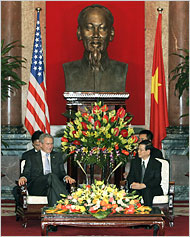 President Bush has said many dumb things in defense of his Iraq policy. Citing the Vietnam War as a model, however, is perhaps his most ludicrous yet.
President Bush has said many dumb things in defense of his Iraq policy. Citing the Vietnam War as a model, however, is perhaps his most ludicrous yet.This past week found the president sitting before a bust of the victorious Ho Chi Minh in Vietnam, seemingly unaware that the United States lost its war with the Communist-led country.
Having long and vehemently denied parallels between the invasions of Vietnam and Iraq, he nevertheless admitted now to seeing one.
"Yes," Bush said. "One lesson is that we tend to want there to be instant success in the world, and the task in Iraq is ... just going to take a long period of time to--for the ideology that is hopeful, and that's an ideology of freedom, to overcome an ideology of hate.... We'll succeed, unless we quit."
Bush seems not to have noticed that we succeeded in Vietnam precisely because we did quit the military occupation of that nation, permitting an ideology of freedom to overcome one of hate. Bush's rhetoric is frighteningly reminiscent of Richard Nixon's escalation and expansion of the Vietnam War in an attempt to buy an "honorable" exit with the blood of millions of Southeast Asians and thousands of American soldiers. In the end, a decade of bitter fighting did not prevent an ignominious U.S. departure from Saigon.
Now, however, Vietnam is at peace with its neighbors and poses no security threat to the United States. Many of the "boat people" have returned as investors, and successive American presidents have made visits to the second fastest-growing economy in Asia. While Vietnam is still run by its Communist Party, eventually postwar leaders on both sides have accepted that peace is practical.
The lesson of Vietnam is not to keep pouring lives and treasure down a dark and poisonous well, but to patiently use a pragmatic mix of diplomacy and trade with even our ideological competitors. (More)
Robert Scheer, HuffingtonPost







No comments:
Post a Comment